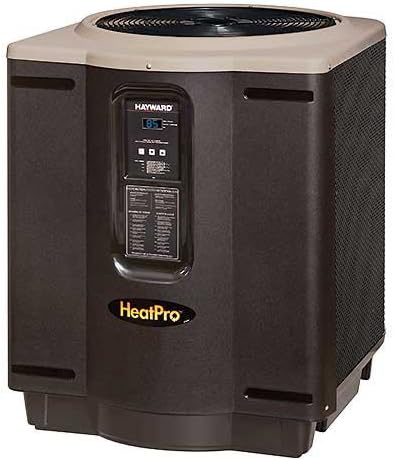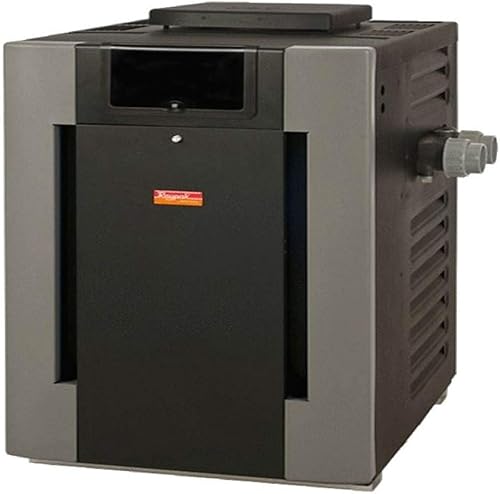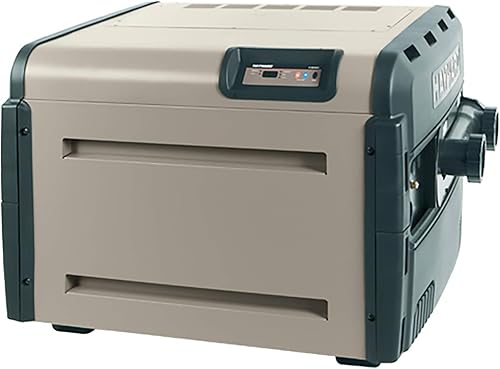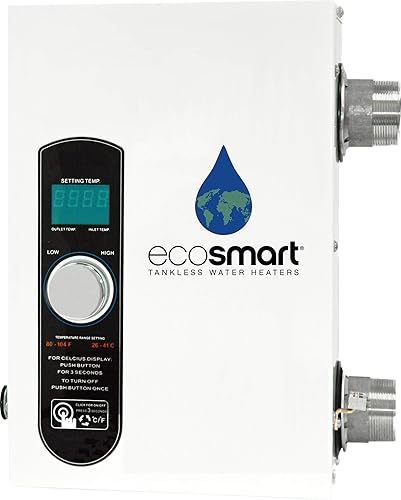If you’re fortunate enough to have a yard at home with space for a swimming pool, you’ll soon discover you need plenty of equipment to keep that pool running optimally.
One of the most crucial pieces of kit is a heater to keep the water at the right temperature year-round and regardless of climate.
Today, we’ll be highlighting a shortlist of the very best swimming pool heaters in a range of classes and at varying price points.
Once we’re done with our reviews, we’ll round out today with a detailed checklist that should help you when you’re comparing the finest heaters on the market.
To start with, you’ll need to consider what type of heater makes the best fit from among the following main categories:
- Electric heat pump
- Solar heater
- Natural gas heater
- Propane gas heater
There’s no right or wrong decision here, purely what works best for you. We’ll be highlighting the chief advantages and drawbacks of each style of swimming pool heater so you can more easily determine the best fit for you.
OK, we’ll launch right in with our detailed pool heater reviews. Once you’ve explored some of the many options at your disposal, we’ll be doubling down on how to make this buying decision as easy as possible.
Dive in!
The 7 Best Swimming Pool Heaters
1. Our #1 Pick: Hayward Pool Heat Pump
Features
- 90,000 BTU
- 270 pounds
- 40 x 31 x 43 inches
Our overall favorite in this collection of the best swimming pool heaters comes from the inimitable Hayward. This pool specialist has been in business for the better part of a century producing highly effective equipment that doesn’t bankrupt you.
This heater comes in multiple configurations. This is the entry-level unit rated at 90,000 BTU. A BTU is the abbreviation for British thermal unit. In plain English, this relates to the amount of heat needed to increase the temperature of 1 pound of water by 1 degree.
The centerpiece of this efficient heater is the evaporator fin. This is corrosion-resistant and built to withstand some serious punishment even if you live in a harsh coastal region.
The heat exchanger is made from titanium so you’ll benefit from a lengthy lifespan and first-class performance.
Thanks to a neatly-engineered acoustic compressor cover, you’ll find this heater kicks out very little noise in operation.
Airflow is optimized through the aggressively-profiled fan blade. This also serves to tamp the noise down further.
With the innards of the heater designed to deliver across the board, the manufacturer pays just as much attention to the chassis of this unit. Cased in durable injection-molded panels, you won’t experience any dust or fine particles penetrating this heater.
While the vast bulk of user feedback concerning this Hayward heater is overwhelmingly positive, we found several gripes about some of the components being bundled inside the pump. This aside, most users are highly satisfied with this quiet and efficient heater rated at 90,000 BTU. It makes a great fit for smaller pools.
| Things We Like | Things We Dislike |
|
|
2. Raypak Natural Gas Pool Heater
Features
- 206,000 BTU
- 200 pounds
- 38 x 29 x 23 inches
Raypak’s natural gas pool heater gives you an affordable and eco-friendly method of heating your pool. As with all pool heaters of this type, it pays to establish the cost and ease of access of natural gas in your area before committing to purchase. Assuming everything checks out, what do you get for your money here?
To kick off, the cabinet of this unit is built to take some sustained punishment. The galvanized metal offers first-rate trust-resistant properties, and it’s built to last for years.
You won’t need to concern yourself with installing any fans. The design of this heater makes it highly capable of drafting naturally.
Take charge of the temperature and heater settings using the digital interface, and the LCD shows you everything you need to see at a glance.
This unit is rated at 206,000 BTU making it a great choice for medium-sized pools. There are also 3 larger and more powerful versions of this heater available if you have the luxury of a larger pool to heat.
There’s a smart microprocessor onboard that controls diagnostics. There’s a nifty readout giving you constant feedback on system health.
You can plumb in the heater directly. You’ll get the requisite 2-inch threaded PVC union thrown in, so you won’t need to head to the hardware store.
Most user reviews are positive. What little negative testimony we could unearth centers on customers reporting poor experiences with customer service. As long as you’re prepared to take a chance on this, you’ll be rewarded by a standout heater in a crowded space. You’ll benefit from outstanding efficiency without needing too much space to accommodate the heater. Keep your pool wonderfully warm year-round, and you don’t need to spend a fortune.
| Things We Like | Things We Dislike |
|
|
3. Hayward Universal H-Series Propane Pool and Spa Heater
- 250,000 BTU
- 171 pounds
- 3 x 30.6 x 32.8 inches
Do you have a substantial-in ground swimming pool? If so, you’ll need a powerful pool heater to keep the water pleasingly warm.
Hayward is one of the most reputable brands in this market segment, and you’ll get a heater that’s well put-together, performs strongly, and is built to stay the distance. Indeed, the only meaningful complaint we could unearth concerning this model concerns disappointing experiences with customer service reported.
The H-Series heater is rated at 250,000 BTU, placing it roughly in the middle of a deep bench of pool heaters.
The heat exchanger is constructed from cupro-nickel, resulting in outstanding lifespan, even in salt-based water or pools with aggressive chemistry conditions.
Using the heater couldn’t be easier thanks to a crisp LED panel and intuitive controls.
One of the other primary draws with this heater is its low eco-footprint. If your pool or spa is located in an area demanding low NOx emissions, this model fits the bill wonderfully.
The heater is powered by propane gas. Expect to use anywhere from 5 pounds to 10 pounds of propane per hour. You should factor this into your budgeting so you don’t end up surprised by running costs.
Even though this is by no means the cheapest swimming pool heater out there, most budget heaters simply cannot capably heat large in-ground pools.
Aside from those complaints about the customer service department at Haywards, you won’t have much else to moan about if you invest in this highly capable unit, hands-down one of the best swimming pool heaters out there.
| Things We Like | Things We Dislike |
|
|
4. FibroPool In-Ground Swimming Pool Heater
- 55,000 BTU
- 120 pounds
- 48 x 24 x 20 inches
Next up comes a less powerful swimming pool heater, although you should still find this model is more than fit for purpose, depending on the size of your in-ground pool at home.
Rated as an energy-efficient system by the US Department of Energy, estimated running costs are just 25 cents an hour, meaning this heater is a much more cost-effective option than the model outlined above from Haywards.
If you have an in-ground swimming pool, this unit can confidently heat pools containing up to 10,000 gallons of water. The heater also works well with above-ground pools measuring 21 feet across if rounded, or 15 x 30 feet if the pool is oval-shaped.
A combination of a titanium heat exchanger and a super-efficient compressor helps you to heat your pool without spending a fortune. The efficiency translates to almost 6 times the heat output per dollar spent on electricity.
Unlike some pool heaters, you won’t struggle to get this model installed. Quick disconnect piping is also appreciated.
The overall dimensions are quite compact, too, so you won’t need to worry about an unattractive heater spoiling the ambiance poolside.
With digital controls and a digital display, you’ll find using this heater is a cinch.
The metal case is treated with an enamel coating to further prolong lifespan, and by heating your pool to an inviting temperature, you will find you prolong the swimming season, too.
Don’t be put off by the reasonably low BTU rating. This is one of the most efficient and capable swimming pool heaters out there. Also, while it’s not especially cheap, it is priced more keenly than much of the opposition.
| Things We Like | Things We Dislike |
|
|
5. Hayward Natural Gas Pool Heater
Features
- 400,000 BTU
- 214 pounds
- 6 x 32.8 x 30.6 inches
Next up we have a powerful natural gas pool heater from Hayward rated at 400,000 BTU. How does this model stand out, then?
To kick off, like all Hayward pool heaters, those in the H-Series are energy-efficient. Beyond this, this low-NOx iteration has a thermal efficiency of 84% and complies with all Californian air emissions regulations.
If the 400,000 BTU version is not to your liking, the H-Series comes in several smaller sizes, too.
Hydraulic performance helps to save energy by cutting down on the circulation time of the pump.
As an example, this heater can raise the temperature in your 800-gallon pool by as much as 30 degrees in just one hour. Sounds tempting, right?
Build quality is robust throughout. The heat exchanger is constructed from cupro nickel, burners are made from stainless steel, and the chambers are efficiently insulated.
Thanks to the forced draft system, air is continuously moved through the combustion chamber. This serves to prevent any variables like wind impacting performance.
Super-simple to use and harnessing an easily-navigable interface and display, this is one of the best swimming pool heaters you can find. All you’ll need is a steady supply of natural gas.
Most users seem to agree with this, and the majority of reviews sing the praises of the heater itself. The isolated complaints we found tended to focus on the quality of customer service. This aside, you can buy this pool heater with complete confidence.
| Things We Like | Things We Dislike |
|
|
6. Smart Pool Solar Heaters
Features
- Solar-powered
- 34 pounds
- 240 x 52 x 2 inches
Solar-powered heaters don’t make the best solution for all pool owners, but if you live somewhere benefiting from year-round sunshine and you’re looking for an eco-friendly method of heating your pool, these panels from Smart Pool are well worth popping on your shortlist.
The polypropylene heat panels are certainly not small. You should first make sure you have room to accommodate these beasts before going any further. They measure up at a whopping 240 x 52 x 2 inches.
Expressly designed for straightforward DIY installation, the panels are capable of raising the temperature in your pool by as much as 15 degrees in 24 hours. While this can’t compete with the performance of some of the more robust heaters on our list, it’s more than fit for most purposes.
You’ll be supplied with a bottle of Liquid Heat Shield solution. Add this to your pool water and it will help to reduce pool evaporation.
There’s also a reel system allowing you to install your solar blanket without straining yourself. This is sold separately so make sure you factor this in when budgeting to avoid any hidden surprises.
This pack comes with 80 feet of solar panels. If you live somewhere with the climate to suit, we can’t recommend this solar swimming pool heater strongly enough. Just brace yourself for the arrival of a supersized package!
| Things We Like | Things We Dislike |
|
|
7. EcoSmart Electric Tankless Pool Heaters
Features
- 27kW, 240V
- 2 pounds
- 6 x 14 x 17 inches
EcoSmart serves up a space-saving solution ideal for heating smaller pools. This is a tankless electric heater, so you won’t get the same BTU rating as you find with gas heaters.
This heater is part of the brand’s enduringly popular POOL line, and you’ll get all the same convenience and efficiency baked in as you would find on this manufacturer’s heaters for your home.
Flow sensor technology helps to avoid scorched elements when heating.
If you thought pool heaters were fiddly and awkward to control, you’ll appreciate the digital thermostat that allows you to make precise adjustments to temperature and easily create the perfect pool environment.
This heater runs quietly in addition to powerfully, and it takes up almost no space. In many ways, this is one of the best swimming pool heaters you can find, even if it falls outside the definition of what you’d expect from a pool heater.
Now, this is not the type of heater that’s plug-and-play, so you’ll need to make provision for professional installation. You should also account for this when you’re costing to avoid any nasty surprises.
The other significant drawback of this pool heater is the fact it may dramatically increase your heating costs. Look into all aspects of your buying decision when you’re comparing the best swimming pool heaters, including ongoing running costs.
| Things We Like | Things We Dislike |
|
|
Things You Should Consider
There are many reasons for investing in the best swimming pool heaters. They can help in the following areas:
- Allowing you to open your pool earlier in the year
- Giving you more time to swim
- Increasing the value of your pool and your property
- Giving you the option to swim early or late in the day when there’s no natural sunlight
- If your pool is not exposed to enough natural sunlight
- To encourage kids into the pool if they hate swimming in cold water – and who doesn’t?
How, then, can you most easily pick the right type of swimming pool heater for the job?
Well, focus on these pointers to discover the heater that makes the best fit:
- Type of Heater
- Size of your pool
- Climate in your area
- Budget
Type of Heater
Swimming pool heaters come in the following main types:
- Heat pumps
- Solar pool heaters
- Gas pool heaters
Heat pumps
A heat pump swimming pool heater utilizes electricity to heat the water in your pool. It achieves this not by generating heat via electricity. Instead, these heaters make use of warm air to briskly heat the water traveling through the pump.
- Benefits: Low annual running costs, eco-friendly, lengthy lifespan (10 to 20 years)
- Drawbacks: Needs electricity supply, costly to purchase, not ideal in cold climates, heats water quite slowly
Solar pool heaters
Solar pool heaters are composed of filters, pumps, solar collectors, and control valves.
If your pool never dips below freezing, an unglazed solar heater would work well. Glazed heaters are more rugged and built to withstand hostile conditions. These are coated with glass covering so they cost a little more. Thanks to costlier materials like copper tubing, they’re also much more efficient than unglazed solar heaters.
- Benefits: Heat your pool quickly, not reliant on ambient temperature, inexpensive, runs whisper-quiet
- Drawbacks: Costly to operate, not as long-lasting as other pool heaters
Gas pool heaters
Gas pool heaters run on either propane or natural gas.
These heaters work by channeling water through a combustion chamber. The water passes through warm copper coils in this chamber before it’s directed to your pool and warms the temperature.
You’ll need to first investigate the cost and availability of propane or natural gas in your area to assess feasibility. Both of these types of heater cost roughly the same. When it comes to the cost of gas, propane is typically more than twice as expensive as natural gas.
When you’re shopping for gas pool heaters, look for one with electronic ignition for a cleaner and more seamless experience.
- Benefits: Low-maintenance, affordable, durable, easy to install, cheap to run
- Drawbacks: Often large and unattractive, awkward to control heat output, doesn’t work well without
Size of your pool
When it comes to working out what kind of heater you need, you should take the size of your pool into account.
Beyond the overall dimensions, ask yourself these questions…
Do you only use your pool at the weekends? If so, you might want to prioritize one that brings the water quickly up to temperature so you can maximize the time you spend in the pool.
Are you looking to keep the water moderately warm at all times? If so, a small heater can work well, but it won’t be quite as energy-efficient.
This area of your buying decision is worth spending some time on to ensure you get the most effective and efficient swimming pool heater.
Climate in your area
All swimming pool heaters work slightly differently, and they have attributes suited to different climates.
For anyone lucky enough to live in a state with year-round sun, solar heaters and heat pumps both make a smart choice.
Gas pumps, on the other hand, are generally a better choice for residents of northern states with greater extremes of temperatures.
Budget
The sticker price of a swimming pool heater is the first area you’ll need to budget.
Beyond this, though, it’s the ongoing running costs of a swimming pool heater you should also consider before whipping out your credit card.
Gas heaters are usually the cheapest to buy upfront. Depending on the cost of natural gas or propane gas in your area, though, this saving could soon end up being negated.
Heat pumps cost more than gas pumps at the point of purchases, and they could also end up costing much more to run.
A solar swimming pool heater is by far the most expensive to buy, but you’ll then benefit from free energy, dramatically slashing running costs.
Now, this should give you more than enough information upon which to base your buying decision. Keep these pointers in mind and you should have no problems finding the right swimming pool heater the easy way.
To finish up today, we’ve curated the answers to a handful of the most frequently asked questions concerning swimming pool heaters so you have everything you need in one place.
FAQs
1) How long does a pool heater last?
This will depend largely on the type of heater you buy, as well as the price and build quality. The average gas heater should last perhaps 6 or 7 years, while many heat pumps will give you 20 years of service. Solar heaters, on the other hand, don’t tend to have such decent lifespans even though they’re prohibitively expensive to buy.
2) To what temperature should I heat my pool?
Again, it depends. The generally recommended baseline temperature is 78F. For children or the elderly, you might want to heat the water to 80F or above.
3) How much more swimming time can I get by investing in a pool heater?
You could double the length of the swimming season you normally enjoy, again climate-dependent.
4) Are there any health benefits associated with heating my pool?
If you have a properly heated pool, you’ll be able to enjoy even more swimming, recommended by doctors and physical therapists as one of the most complete forms of exercise. Swimming is also very easy on the joints, unlike running on hard ground. The more inviting the water in your pool, the more often you’re likely to use it. Repeated chilling causes by too much body heat being lost can trigger respiratory infections in the young and the elderly.
5) What costs are involved in heating a swimming pool?
You’ll first need to budget for the initial cost of the heater along with any costs needed to install it. After this, you should look at the cost of fuel on a monthly basis. This will obviously vary depending on the type of heater you choose. You’ll also need to give due consideration to the cost of servicing and maintenance. You should know before you even think about buying a swimming pool for your home that it costs a reasonable amount to keep this things running at their best. To reduce these costs as much as practical, make sure you choose the right type of heater that’s capable of efficiently heating your pool. Always use a pool filter, and be sure to cover your pool when it’s not in use. The good news, though? Buying a pool is worth every cent.
6) Why is the pilot light on my gas swimming pool heater not working?
This is probably the most frequently experienced issue with this type of pool heater. Check that the gas pressure is normal, and also check that the vents are not blocked.
7) The water doesn’t seem warm enough even after heating. What should I do?
In most cases, if the water doesn’t feel like it’s hot enough, all you need to do is tweak the thermostat. Sometimes, though, insufficient water temperature points toward a heater that’s not fit for purpose in your pool.
8) Why is there rust in my pool?
You may find that the chemicals you use in your pool start corroding the elements in your heater. If you happen to notice any rust at all in your pool, the first thing you should do is check that the pool chemicals you are using are properly balanced.
Conclusion
You might have arrived here today at Wild River Country without the first clue about choosing the best swimming pool heaters.
After examining our curated shortlist, you should now be clear about which of these heaters would make the smoothest fit for your pool at home.
By opting for any of the heaters on our shortlist, you can buy with your eyes open and a clear understanding of how these heaters work, as well as their key benefits and drawbacks. If you run across a heater we didn’t review today, we hope our buying tips guide you to make the right decision the easy way.
Before you head off, please bookmark our blog, and pop back soon for more great pool content! See you soon!







